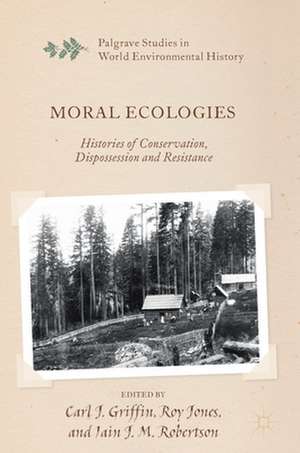Moral Ecologies: Histories of Conservation, Dispossession and Resistance: Palgrave Studies in World Environmental History
Editat de Carl J. Griffin, Roy Jones, Iain J. M. Robertsonen Limba Engleză Hardback – 21 mar 2019
Preț: 593.08 lei
Preț vechi: 697.75 lei
-15% Nou
Puncte Express: 890
Preț estimativ în valută:
113.50€ • 123.24$ • 95.34£
113.50€ • 123.24$ • 95.34£
Carte tipărită la comandă
Livrare economică 22 aprilie-06 mai
Preluare comenzi: 021 569.72.76
Specificații
ISBN-13: 9783030061111
ISBN-10: 3030061116
Pagini: 349
Ilustrații: XIII, 306 p. 16 illus., 11 illus. in color.
Dimensiuni: 148 x 210 x 31 mm
Greutate: 0.67 kg
Ediția:1st ed. 2019
Editura: Springer International Publishing
Colecția Palgrave Macmillan
Seria Palgrave Studies in World Environmental History
Locul publicării:Cham, Switzerland
ISBN-10: 3030061116
Pagini: 349
Ilustrații: XIII, 306 p. 16 illus., 11 illus. in color.
Dimensiuni: 148 x 210 x 31 mm
Greutate: 0.67 kg
Ediția:1st ed. 2019
Editura: Springer International Publishing
Colecția Palgrave Macmillan
Seria Palgrave Studies in World Environmental History
Locul publicării:Cham, Switzerland
Cuprins
1. Moral Ecologies: Histories of Conservation, Dispossession and Resistance.- I. Conservation as Dispossession.- 2. Politics of Conservation, Moral Ecology and Resistance by the Sonaha Indigenous Minorities of Nepal.- 3. Global Ecologies and Local Moralities: Conservation and Contention on Western Australia’s Gascoyne Coast.- 4. From Activists to Illegally Occupying Land: Aboriginal Resistance as Moral Ecology in Perth, Western Australia.- 5. Ghosts in the Forest: The Moral Ecology of Environmental Governance toward Poor Farmers in the Brazilian and US Atlantic Forests.- II. Conservation as Occupation.- 6. Crimes against Cultures: How Local Practices of Regulation Shape Archaeological Landscapes in Trowulan, East Java.- 7. Of Necessary Work: The Longue Durée of the Moral Ecology of the Hebridean Gàidhealtachd.- 8. Demographic Fluidity and Moral Ecology: Queenstown (Tasmania) and a Lesson in Precarious Process.- 9. ‘Fearless, Free and Bold’: The Moral Ecology of Kelly Country.- 10. Squatting as Moral Ecology: the Politics of Dwelling in the New Forest, England.- 11. A ‘Moral Ecology’ of Afrikaner Settlement in German East Africa, 1902–1914.- 12. Afterword: On Moral Ecologies and Archival Absences.
Notă biografică
Carl J. Griffin is Professor of Historical Geography at the University of Sussex, UK.
Roy Jones is Emeritus Professor of Geography at Curtin University, Perth, Australia.
Iain J. M. Robertson is Reader in History at the University of the Highlands and Islands, UK.
Textul de pe ultima copertă
This book offers the first systematic study of how elite conservation schemes and policies define once customary and vernacular forms of managing common resources as banditry—and how the ‘bandits’ fight back. Drawing inspiration from Karl Jacoby’s seminal Crimes against Nature, this book takes Jacoby’s moral ecology and extends the concept beyond the founding of American national parks. From eighteenth-century Europe, through settler colonialism in Africa, Australia and the Americas, to postcolonial Asia and Australia, Moral Ecologies takes a global stance and a deep temporal perspective, examining how the language and practices of conservation often dispossess Indigenous peoples and settlers, and how those groups resist in everyday ways. Drawing together archaeologists, anthropologists, geographers and historians, this is a methodologically diverse and conceptually innovative study that will appeal to anyone interested in the politics of conservation, protest and environmental history.
Caracteristici
Extends the concept of “moral ecology” developed by Karl Jacoby to case studies across Europe, Africa, Australia, Asia and the Americas Examines how conservation efforts dispossess local populations, particularly poor Indigenous peoples and settlers Features an afterword by Karl Jacoby













